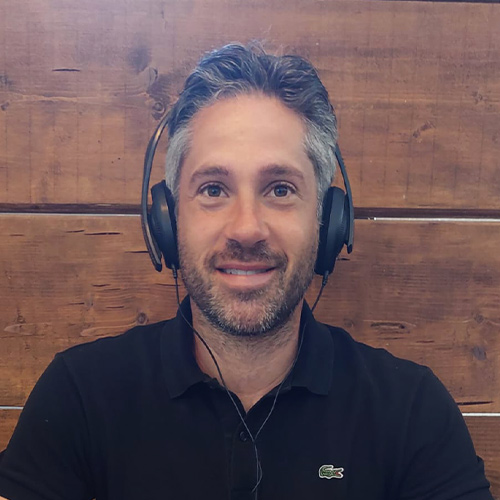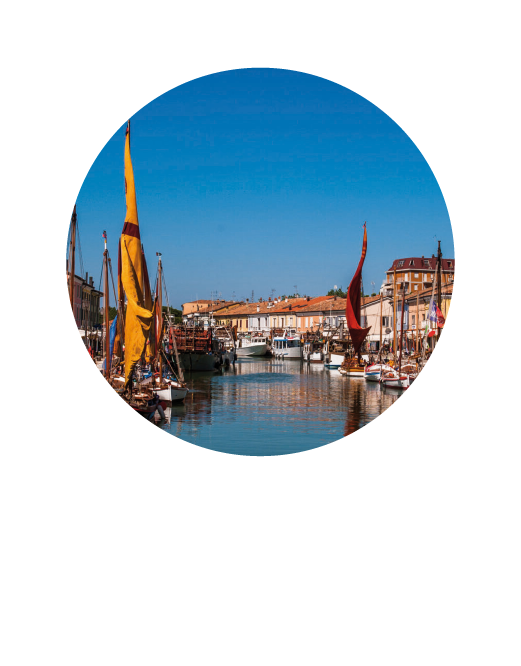

The Trade Fish Market (on the corner of Via Squero and Via Matteucci)
The Trade Fish Market (on the corner of Via Squero and Via Matteucci)
Riproduci traccia audio
Play audio track
Audio-Track abspielen
The Trade Fish Market (on the corner of Via Squero and Via Matteucci)
Trascrizione traccia audio
I would like to talk about something that Cesenatico lost.
Nobody knows, but we were one of the largest ports for bluefin tuna fishing and I don’t want this story to be forgotten.
In the fifties fishermen came here to teach us tuna fishing from the town of Grado (in the far northeast of Italy), in turn we taught the skills to the fishermen of Pescara, further south on the Adriatic coast.
Then, when tuna fishing began to become an important and major trade, firstly quotas were introduced and finally, in 2008, we were stripped of our licences.
This wasn’t just fishing; it was an event and I was lucky enough to have witnessed the last few years of this era when I was just a boy.
In the spring, when the air became warmer the shoals of tuna arrived.
The oily fishing season had just ended (known locally as the blue fishing season). The boats would be equipped for tuna fishing with tuna nets, the cabins were dismantled, and winches were mounted. The boats would head offshore 20, 50 even 70 miles from the coast.
I am taken back to the memories of those days.
When you left home to go to sea you already knew what the weather was going to be like, based on the temperature, the humidity and even the smell in the air.
At first, we were excited, but the sightings can take weeks where boredom takes over and you feel disheartened. Even if you do spot them, you might only be lucky once in a hundred times.
From morning to evening, out with binoculars, stopping every so often to catch either a faint movement of the water, or even the smell of the approaching shoal. Eventually a fin would protrude the water, or the inky stain of the sea with the dark silhouette of the shoal below is finally visible from the top of the fishing boat.
Just the sight of them gives you goose bumps, a shiver of excitement, and the greatest of emotions. You wait, you wait, and then suddenly the time has come for you to face up to the job in hand.
The net is lowered around encircling the shoal. Each catch is unforgettable and is remembered by the precise place and the little anecdotal stories that you will tell, who broke the net, who caught a giant turtle
Each tuna was removed by hand, one by one from the net. Still a boy myself, I would dive into the net and it was a very strange feeling to feel the fish moving below me. At night I was put on guard, checking that we were not hit by any passing boats. I would lay on the net looking at the stars.
When we returned to the dockside, everybody came to see us: not only the families waiting for us, but the whole town. We had a satellite phone, and the old mariners would call us to find out if “we had a catch”. Then word spread quickly around: “They are coming! They’re coming!”
Our journey ended here at the trade fish market, and this is the quay where the buyers would gather. It took a day or two to unload the fish. Our load would be 50 tonnes, with each tuna weighing 20, 50 or up to 200 kilos, we needed winches and trucks. Everyone had to help. Sales were handled by the auctioneer, with whom potential buyers would whisper offers in their ears. This fishing provided a living to more than 200 families.
The elderly fishermen that I meet today on the quayside, want to tell their stories, but sometimes they don’t know how to or who to tell. I help, I ask them lots of precise questions, gather up all the loose ends and tie them together to recompose their fragmented stories, interwoven with gestures and words that are not found in a regular dictionary, sometimes not even in our local dialect.
When you are at sea you become a different person, there is no time to talk, so when you return to land, what goes on at sea, remains at sea.
Audio Track transcription
I would like to talk about something that Cesenatico lost.
Nobody knows, but we were one of the largest ports for bluefin tuna fishing and I don’t want this story to be forgotten.
In the fifties fishermen came here to teach us tuna fishing from the town of Grado (in the far northeast of Italy), in turn we taught the skills to the fishermen of Pescara, further south on the Adriatic coast.
Then, when tuna fishing began to become an important and major trade, firstly quotas were introduced and finally, in 2008, we were stripped of our licences.
This wasn’t just fishing; it was an event and I was lucky enough to have witnessed the last few years of this era when I was just a boy.
In the spring, when the air became warmer the shoals of tuna arrived.
The oily fishing season had just ended (known locally as the blue fishing season). The boats would be equipped for tuna fishing with tuna nets, the cabins were dismantled, and winches were mounted. The boats would head offshore 20, 50 even 70 miles from the coast.
I am taken back to the memories of those days.
When you left home to go to sea you already knew what the weather was going to be like, based on the temperature, the humidity and even the smell in the air.
At first, we were excited, but the sightings can take weeks where boredom takes over and you feel disheartened. Even if you do spot them, you might only be lucky once in a hundred times.
From morning to evening, out with binoculars, stopping every so often to catch either a faint movement of the water, or even the smell of the approaching shoal. Eventually a fin would protrude the water, or the inky stain of the sea with the dark silhouette of the shoal below is finally visible from the top of the fishing boat.
Just the sight of them gives you goose bumps, a shiver of excitement, and the greatest of emotions. You wait, you wait, and then suddenly the time has come for you to face up to the job in hand.
The net is lowered around encircling the shoal. Each catch is unforgettable and is remembered by the precise place and the little anecdotal stories that you will tell, who broke the net, who caught a giant turtle
Each tuna was removed by hand, one by one from the net. Still a boy myself, I would dive into the net and it was a very strange feeling to feel the fish moving below me. At night I was put on guard, checking that we were not hit by any passing boats. I would lay on the net looking at the stars.
When we returned to the dockside, everybody came to see us: not only the families waiting for us, but the whole town. We had a satellite phone, and the old mariners would call us to find out if “we had a catch”. Then word spread quickly around: “They are coming! They’re coming!”
Our journey ended here at the trade fish market, and this is the quay where the buyers would gather. It took a day or two to unload the fish. Our load would be 50 tonnes, with each tuna weighing 20, 50 or up to 200 kilos, we needed winches and trucks. Everyone had to help. Sales were handled by the auctioneer, with whom potential buyers would whisper offers in their ears. This fishing provided a living to more than 200 families.
The elderly fishermen that I meet today on the quayside, want to tell their stories, but sometimes they don’t know how to or who to tell. I help, I ask them lots of precise questions, gather up all the loose ends and tie them together to recompose their fragmented stories, interwoven with gestures and words that are not found in a regular dictionary, sometimes not even in our local dialect.
When you are at sea you become a different person, there is no time to talk, so when you return to land, what goes on at sea, remains at sea.
Audiotrack-Text
I would like to talk about something that Cesenatico lost.
Nobody knows, but we were one of the largest ports for bluefin tuna fishing and I don’t want this story to be forgotten.
In the fifties fishermen came here to teach us tuna fishing from the town of Grado (in the far northeast of Italy), in turn we taught the skills to the fishermen of Pescara, further south on the Adriatic coast.
Then, when tuna fishing began to become an important and major trade, firstly quotas were introduced and finally, in 2008, we were stripped of our licences.
This wasn’t just fishing; it was an event and I was lucky enough to have witnessed the last few years of this era when I was just a boy.
In the spring, when the air became warmer the shoals of tuna arrived.
The oily fishing season had just ended (known locally as the blue fishing season). The boats would be equipped for tuna fishing with tuna nets, the cabins were dismantled, and winches were mounted. The boats would head offshore 20, 50 even 70 miles from the coast.
I am taken back to the memories of those days.
When you left home to go to sea you already knew what the weather was going to be like, based on the temperature, the humidity and even the smell in the air.
At first, we were excited, but the sightings can take weeks where boredom takes over and you feel disheartened. Even if you do spot them, you might only be lucky once in a hundred times.
From morning to evening, out with binoculars, stopping every so often to catch either a faint movement of the water, or even the smell of the approaching shoal. Eventually a fin would protrude the water, or the inky stain of the sea with the dark silhouette of the shoal below is finally visible from the top of the fishing boat.
Just the sight of them gives you goose bumps, a shiver of excitement, and the greatest of emotions. You wait, you wait, and then suddenly the time has come for you to face up to the job in hand.
The net is lowered around encircling the shoal. Each catch is unforgettable and is remembered by the precise place and the little anecdotal stories that you will tell, who broke the net, who caught a giant turtle
Each tuna was removed by hand, one by one from the net. Still a boy myself, I would dive into the net and it was a very strange feeling to feel the fish moving below me. At night I was put on guard, checking that we were not hit by any passing boats. I would lay on the net looking at the stars.
When we returned to the dockside, everybody came to see us: not only the families waiting for us, but the whole town. We had a satellite phone, and the old mariners would call us to find out if “we had a catch”. Then word spread quickly around: “They are coming! They’re coming!”
Our journey ended here at the trade fish market, and this is the quay where the buyers would gather. It took a day or two to unload the fish. Our load would be 50 tonnes, with each tuna weighing 20, 50 or up to 200 kilos, we needed winches and trucks. Everyone had to help. Sales were handled by the auctioneer, with whom potential buyers would whisper offers in their ears. This fishing provided a living to more than 200 families.
The elderly fishermen that I meet today on the quayside, want to tell their stories, but sometimes they don’t know how to or who to tell. I help, I ask them lots of precise questions, gather up all the loose ends and tie them together to recompose their fragmented stories, interwoven with gestures and words that are not found in a regular dictionary, sometimes not even in our local dialect.
When you are at sea you become a different person, there is no time to talk, so when you return to land, what goes on at sea, remains at sea.
Narrato da
Narrated by
Mehr Infos



